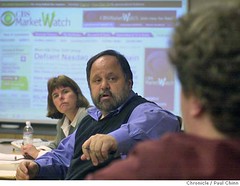
(image via sfgate)
The Corsair once again diligently stalks CBS News Digital's Larry Kramer, who is, IMHO, the most intriguing figure in the rapidly changing digital news space. These changes remind The Corsair of Hegel's spectral "Geist" unfolding in the pages of Phenomenology of Spirit. He's doing bold, risky things at CBSNews. Borrowing from the momentum of the rise of cameraphones and citizen journalism (Of which, Al Gore's Current TV, which launched on Monday, is the most fully realized example), Kramer is establishing a "conversation," of sorts, via the new CBS "Private Eye" blog, between the viewers of CBSNews and the executive staff. According to CJR (link via iwantmedia):
"The main change (at CBSNews.com) was the entire CBS News operation was committed to work on CBSNews.com. So all 1,500 people at CBS News now also contribute to CBSNews.com."
This means, in essence, that CBSNews.com is now, for all intents and purposes, no longer the farm leagues (As online news divisions were back in the day The Corsair worked at Silicon Alley Daily), but full partners in the production of the network news. Incidentally, this trend extends into hard print. The New York Times is doing the same thing, integrating NYTimes.com and the Old Gray Lady. As Bill Keller and Martin Niesenholtz put it in their joint memo today (link via Gawker via Romenesko), "Over the past ten years the newsroom of Nytimes.com and the newsroom on 43rd Street have been partners at a distance -- separated administratively, culturally, geographically and financially. We have built bridges -- most notably the Continuous News Desk -- and we have admired each other's work, but we have not been full collaborators."
They continue, "Until we move into the new building, we cannot physically merge the newsrooms, but we are looking at ways to promote much more side-by-side cooperation in conceiving and executing journalism. Web producers should routinely participate in the daily conversations where coverage is launched. Senior editors of the Web should be a presence at all of the meetings where the masthead, department heads, feature editors, enterprise editors and others hatch plans. In the newsroom at 43rd Street, everyone should come to regard the website as his or her responsibility."
Larry Kramer goes on in CJR about the integration of CBS News and CBSNews.com, in what could very well be an addendum to the New York Times memo:
"That's a massive sea change for a television news operation, and the reason we're able to do it, one of the reasons, is [CBS doesn't] have cable [news]. So whereas an NBC correspondent who files from the field for, say, the NBC 'Nightly News,' also files from the field for MSNBC and CNBC, our correspondents don't have those other outlets.
"What we did was we created the new outlet -- a 24-hour outlet for them -- we just put it on the Web. And we argue, and I think convincingly, that if MSNBC and Fox and a number of the news networks knew ten or fifteen years ago what they know today, they might not make the same investment in building a cable news operation, because with the advent of broadband on the Web, the Web is really a much more attractive place to get news, even news video, now."
That sounds just about right (For further reference on the vicissitudes of cable news, see this). The integration of the online with the offline may just stem the bleeding of mainstream media by the internet (and gaming).
But what of Vaughn Ververs's position at CBS News as "nonbudsman," and how his new job of this era of digital news will differ from the traditional position of "ombudsman," to wit:
"An ombudsman in most cases actually writes and criticizes the news coverage of the newspaper. So if you look at most ombudsmen, look at some of the papers doing it, they make judgments about [coverage]: 'We could have done this better, we could have done that better.' We're not asking him to do that."
This -- again -- is a major development in reporting for which we may want to pause. As a result of RatherGate, CBSNews is going to introduce internet commentary into the news reporting process. Kramer elaborates:
"We're asking (Ververs) to go out and find out what the public is saying about our coverage, and what others are saying, and then we're asking him to pick the most intelligent commentary he sees out there about how we're covering the news -- and there is a lot of it -- or how news in general is being covered, not just by us (like 'Why is the press covering the Runaway Bride so much?'), and then his job is to then go into CBS News, and get the opinion of the top management or the correspondents involved at CBS News as to what's going on with that story, why we're doing it, and moderate that discussion.
"So he'll post the criticism from the outside, he'll post reactions from the CBS News people, and he'll be a moderator. He'll be like the moderator on 'Crossfire.' He won't be a columnist who's asked his own opinion. His job isn't to give us his opinion. His job is to get the intelligent discussion on the outside world exposed to CBS, and have CBS react to it, and let people on the outside throw out their criticism of what we're doing. So he's meant to moderate that discussion."
The Crossfire reference was indeed unfortunate, but the idea is exciting. The full CJR interview here. The New York Times memo here.
No comments:
Post a Comment